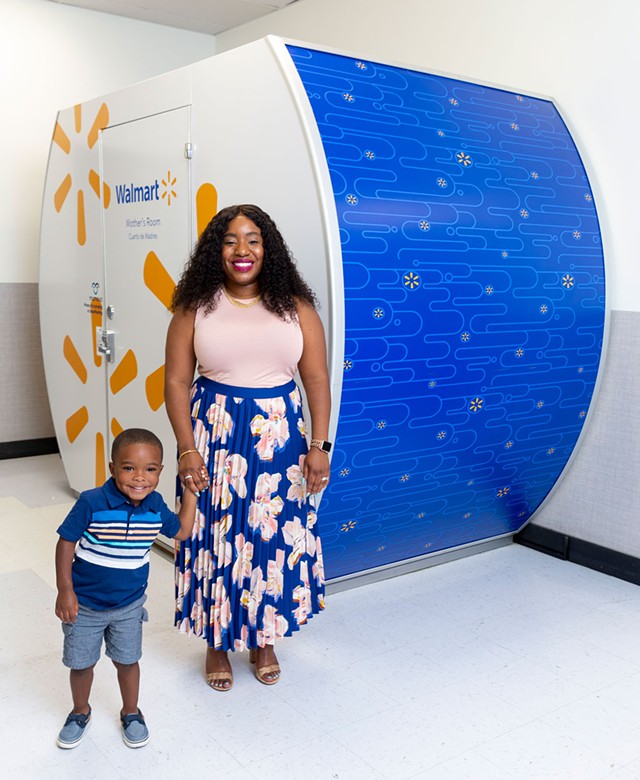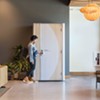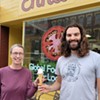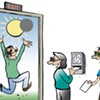Switch to the mobile version of this page.
Vermont's Independent Voice
- News
- Arts+Culture
- Home+Design
- Food
- Cannabis
- Music
- On Screen
- Events
- Jobs
- Obituaries
- Classifieds
- Personals
Browse News
Departments
Browse Arts + Culture
View All
local resources
Browse Food + Drink
View All
Browse Cannabis
View All
-
Culture

'Cannasations' Podcaster Kris Brown Aims to 'Humanize'…
-
True 802

A Burlington Cannabis Shop Plans to Host…
-
Business

Judge Tosses Burlington Cannabiz Owner's Lawsuit
-
Health + Fitness

Vermont's Cannabis Nurse Hotline Answers Health Questions…
-
Business

Waterbury Couple Buy Rare Vermont Cannabis License
Browse Music
View All
Browse On Screen
Browse Events
Browse Classifieds
Browse Personals
-

If you're looking for "I Spys," dating or LTRs, this is your scene.
View Profiles
Special Reports
Pubs+More
Bottom Line: With Walmart Order, Burlington Business Mamava Is Pumping Again
Published September 2, 2020 at 11:10 a.m. | Updated September 3, 2020 at 3:51 p.m.
click to enlarge 

- Courtesy Of Mamava
- Walmart employee Tennille Webb, who advocated for Mamava lactation units
Mamava cofounder and CEO Sascha Mayer initially thought her company might get a boost from the pandemic — albeit one with a nine- to 12-month gestation. The nationwide lockdown, she imagined, would give couples more time together. "I was optimistic about a baby boom," Mayer explained.
More babies would mean more potential users of Mamava's lactation units. The Burlington company's sleek but friendly-looking pods are designed to provide breastfeeding mothers with a clean, quiet, private space to pump or nurse when away from home. Since 2013, Mamava has sold more than 1,200 units to airports, event centers and corporations.
But, as the economic and social effects of the coronavirus drag on, the extended disruption has presented challenges to the company that Mayer helms with cofounder and COO Christine Dodson. Many moms are staying put. Travel is down; most entertainment and sports venues remain shuttered; more people are working from home and shopping online.
So it was a bright spot for Mamava last week when Walmart announced the installation of 120 lactation pods across the retail giant's network of stores. (The Williston Walmart has had a test unit since last summer.) That number was scaled back more than 50 percent from the pre-pandemic plan, but Mayer said Mamava expects to meet the original goal over a longer period of time.
Thanks in large part to the original Walmart order, Mamava began 2020 at full throttle. Sales of the units — which start at $10,000 — were projected to hit between $15 million and $20 million. The company, a B Corp with a social mission, had just completed a successful round of financing. Ownership is split about evenly between outside investors and employees, all of whom receive stock options.
From January to early March, Mamava added 14 new employees for a total of 40. All but eight are based in the company's Battery Street headquarters.
Mamava's primary manufacturing partner, Konrad Prefab in Springfield, Vt., was also ramping up production.
"We were gearing up, putting people in place in anticipation of this Walmart rollout," Mayer said.
Then 2020 swerved off the rails.
"I'll remember the day forever. It was Friday, March 13," Mayer recalled. "I was about to go down to South by Southwest to present, and then it was canceled," she said, referring to the media and music festival in Austin, Texas.
"It was almost like the pandemic wasn't real until some sort of gesture that grand, something [that big], was canceled," Mayer added.
The Mamava team could see that people were changing their behavior via their smartphone app, which has 150,000 downloads. The app is a key part of the company's overall business strategy. It allows women to locate lactation pods and gain secure access via Bluetooth. It also empowers users to add to a directory of lactation spaces other than Mamava units, report pod sanitation or access issues, and even leave words of encouragement for other moms.
As lockdowns rolled out nationwide, the digital team could see that "moms were not out in the world looking for lactation pods," Mayer said. Activity was down 80 percent in April.
While pod usage itself does not generate revenue for Mamava, having breastfeeding mothers out and about is a crucial sales tool. "Our primary marketing vehicle [is] the units in the field: 'I saw you in an airport,' 'I saw you at Fenway Park' or 'I saw you at this convention center,'" Mayer explained. "Our inbound leads flatlined, and we had to figure out what channels were still going to be vital ... Where were women still going to work?"
The company slashed 2020 revenue projections nearly in half. A federal Paycheck Protection Program loan of $525,000 helped cover payroll for a few months.
In July, about half of Mamava's employees scaled back to 80 percent time; the other half took a uniform percent pay cut across the board. "That will get us through the end of the year," Mayer said. Depending on the overall economic outlook, she added, "We honestly don't know yet what 2021 and 2022 will look like."
Another big unknown is whether the pandemic-era shift to working from home will continue. The bulk of Mamava's revenue comes from businesses; those with more than 50 employees are required by law to provide a private space for pumping that is not a bathroom. (Some states have lower employee thresholds.)
Mamava's team has been working remotely since mid-March, and Mayer herself admitted that she's far more productive at home. "I don't want to ever go back to the traditional office environment," she said.
But, she pointed out, many breastfeeding moms have jobs that cannot be done remotely. Those who can work at home are likely to continue to gather at least occasionally for collaboration and to maintain company culture. And those federal regulations apply to workplaces even when employees come in just one day a week.
While Mamava's sales to sectors such as travel have slowed significantly, others have continued to grow, Mayer noted. "We have sold to a couple of CBD and, I believe, marijuana growers on the West Coast," she said. "That industry is doing fine."
Recently, the sales team has seen a slight uptick in inbound leads. "Moms are out and about, seeing our units and inquiring after seeing them," Mayer said. That kind of advocacy is pure gold for Mamava. A Walmart employee who used a pod while traveling set the wheels in motion for the current rollout.
Beyond providing welcome revenue during this lean year, Mayer said, Mamava's presence in Walmart advances a core company mission. Unlike the pods at airports and event venues, or those to which only employees of a particular business have access, the ones at Walmart will become part of many people's regular routines.
"Now there'll be people who work at Walmart and go to Walmart who'll see our units maybe two or three times a week," Mayer said. "Our hope is that it's going to really send a signal that breastfeeding happens. Breastfeeding is supported. It's not for the elite. That's sort of the scale we never had before."
Learn more at mamava.com.
The original print version of this article was headlined "Pregnant Pause"
Related Stories
Got something to say?
Send a letter to the editor
and we'll publish your feedback in print!
Tags: Business
More By This Author
About The Author

Melissa Pasanen
Bio:
Melissa Pasanen is a food writer for Seven Days. She is an award-winning cookbook author and journalist who has covered food and agriculture in Vermont for 20 years.
Melissa Pasanen is a food writer for Seven Days. She is an award-winning cookbook author and journalist who has covered food and agriculture in Vermont for 20 years.
Comments
Comments are closed.
From 2014-2020, Seven Days allowed readers to comment on all stories posted on our website. While we've appreciated the suggestions and insights, right now Seven Days is prioritizing our core mission — producing high-quality, responsible local journalism — over moderating online debates between readers.
To criticize, correct or praise our reporting, please send us a letter to the editor or send us a tip. We’ll check it out and report the results.
Online comments may return when we have better tech tools for managing them. Thanks for reading.
- 1. Vermont Senate Votes Down Ed Secretary Nominee Zoie Saunders Education
- 2. Governor Makes Last-Minute Appeal to Delay Vote on Ed Secretary Nominee Education
- 3. UVM, Middlebury College Students Set Up Encampments to Protest War in Gaza News
- 4. Dog Hiking Challenge Pushes Humans to Explore Vermont With Their Pups True 802
- 5. Scott Official Pushes Back on Former State Board of Ed Chair's Testimony Education
- 6. Help Seven Days Report on Rural Vermont 7D Promo
- 7. Burlington Budget Deficit Balloons to $13.1 Million News
- 1. Totally Transfixed: A Rare Eclipse on a Bluebird Day Dazzled Crowds in Northern Vermont 2024 Solar Eclipse
- 2. Zoie Saunders, Gov. Scott’s Pick for Education Secretary, Faces Questions About Her Qualifications Education
- 3. Don't Trash Those Solar Eclipse Glasses! Groups Collect Them to Be Reused 2024 Solar Eclipse
- 4. State Will Build Secure Juvenile Treatment Center in Vergennes News
- 5. Vermont Awarded $62 Million in Federal Solar Incentives News
- 6. Queen of the City: Mulvaney-Stanak Sworn In as Burlington Mayor News
- 7. New Jersey Earthquake Is Felt in Vermont News








































